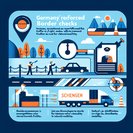
A new survey by Germany’s Federal Institute for Population Research, released on 5 November, shows a decisive shift in the intentions of those who fled Russia’s invasion of Ukraine. According to the report, 59 percent of the roughly 1.1 million Ukrainians who arrived since February 2022 now plan to stay in Germany for several years or permanently; 49 percent say they could settle ‘forever’.
Employment has been the game-changer. The share of adult Ukrainians in work leapt from 18 percent in 2022 to about 50 percent today, helped by fast-track work authorisations and language courses. Family reunification is another anchor: almost one-third of respondents have already brought partners, parents or children to Germany, and many more plan to do so once the two-year waiting period for broader family reunion lapses in mid-2026.
![Majority of Ukrainian Refugees Intend to Remain in Germany, Government Study Finds]()
For Germany, the trend offers welcome relief in a labour market where vacancies still hover above two million. Manufacturing regions such as Bavaria and Baden-Württemberg report that Ukrainian engineers and technicians are filling critical gaps in automotive and machinery plants, while hospitals rely heavily on Ukrainian nursing staff. Employers, however, warn that uncertainty over long-term residency rights—particularly for those holding EU-wide Temporary Protection status—remains a retention risk. HR teams are urged to map pathways from temporary status to the new five-year naturalisation track and to budget for extended language and integration support.
The findings also raise geopolitical questions. Ukrainian officials worry about demographic drain, noting that more than one-quarter of male respondents aged 25-40 do not envision returning even after the war. Berlin says it will continue to encourage voluntary return once conditions allow but stresses that integration support is “in Germany’s economic interest.”
For global-mobility leaders the implications are twofold: companies can tap a growing pool of German-based Ukrainian talent but must navigate evolving work-authorisation rules as Brussels debates the future of Temporary Protection beyond March 2026.
Employment has been the game-changer. The share of adult Ukrainians in work leapt from 18 percent in 2022 to about 50 percent today, helped by fast-track work authorisations and language courses. Family reunification is another anchor: almost one-third of respondents have already brought partners, parents or children to Germany, and many more plan to do so once the two-year waiting period for broader family reunion lapses in mid-2026.

For Germany, the trend offers welcome relief in a labour market where vacancies still hover above two million. Manufacturing regions such as Bavaria and Baden-Württemberg report that Ukrainian engineers and technicians are filling critical gaps in automotive and machinery plants, while hospitals rely heavily on Ukrainian nursing staff. Employers, however, warn that uncertainty over long-term residency rights—particularly for those holding EU-wide Temporary Protection status—remains a retention risk. HR teams are urged to map pathways from temporary status to the new five-year naturalisation track and to budget for extended language and integration support.
The findings also raise geopolitical questions. Ukrainian officials worry about demographic drain, noting that more than one-quarter of male respondents aged 25-40 do not envision returning even after the war. Berlin says it will continue to encourage voluntary return once conditions allow but stresses that integration support is “in Germany’s economic interest.”
For global-mobility leaders the implications are twofold: companies can tap a growing pool of German-based Ukrainian talent but must navigate evolving work-authorisation rules as Brussels debates the future of Temporary Protection beyond March 2026.










